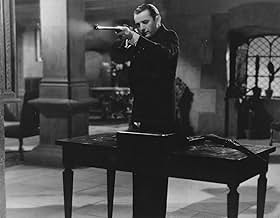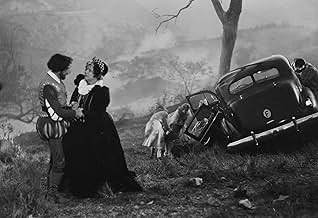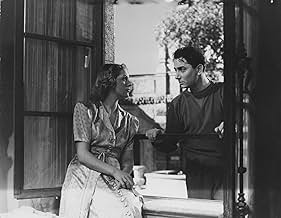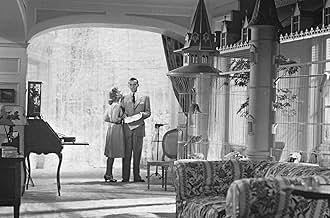Füge eine Handlung in deiner Sprache hinzuA shimmering glass hotel at the top of a remote Provençal mountain provides the setting for a tragicomic tapestry about an obsessive love pentangle.A shimmering glass hotel at the top of a remote Provençal mountain provides the setting for a tragicomic tapestry about an obsessive love pentangle.A shimmering glass hotel at the top of a remote Provençal mountain provides the setting for a tragicomic tapestry about an obsessive love pentangle.
Jane Marken
- Louise Martinet
- (as Jeanne Marken)
Raymond Aimos
- Ernest
- (as Aimos)
Josette Paddé
- Une dame au bal masqué
- (Nicht genannt)
Georges Yvon
- Un ouvrier
- (Nicht genannt)
Empfohlene Bewertungen
"Lumière d'Ete " is probably Grémillon's most ambitious work.Made during the Occupation days,many people consider it his best.One should add it's also his less accessible.
Although it's a Prévert/Laroche screenplay ,the main influence here is Renoir's .All that concerns Paul Bernard's character and his fete in the castle strongly recalls "La Règle du Jeu" .Probably the center of gravity of the movie ,this memorable sequence of the farandole - while the tragedy is impending- will find an equivalent in Prévert/Carné's ending of "Les Enfants Du Paradis".
There are only five characters :three men and two women.
Cri-Cri (Madeleine Renaud,Grémillon's favorite actress) ,her lover Patrice and a failed painter (Pierre Brasseur) represent the bourgeois society.
Michèle (Madeleine Robinson) and Julien(Georges Marchal) are the working class heroes .The latter thoroughly deserves this name,in every sense of the term.
Patrice is a perverse man with a racy -and even criminal- past who does not love Cri-Cri anymore :did he ever love her anyway? or was he just pretending because she knew too many bad things about him?A man of leisure,he invites Roland (the artist) in his castle just because he desires his partner Michele .
In direct contrast to that ,we have the working men: they are building a dam and they are useful.And they are here when it comes to lend a helping hand .
There's a good use of the "play in the play " trick;During the costume ball,Roland is disguised as Hamlet ,which makes sense.Apart from Shakespeare, Laroche and Prevert hint at French writer Comtesse de Ségur,since Cri-Cri's hotel is called "L'Ange Gardien" (The guardian angel) and one of the guests thinks of dressing up as General Dourakine .
For all its qualities,"Lumière d'Eté " is less appealing than "Pattes Blanches" where Paul Bernard plays a squire again : the first third of the 1943 work drags on a bit and may put off some viewers.Nonetheless,it is essential viewing for anyone interested in the French cinema.
Although it's a Prévert/Laroche screenplay ,the main influence here is Renoir's .All that concerns Paul Bernard's character and his fete in the castle strongly recalls "La Règle du Jeu" .Probably the center of gravity of the movie ,this memorable sequence of the farandole - while the tragedy is impending- will find an equivalent in Prévert/Carné's ending of "Les Enfants Du Paradis".
There are only five characters :three men and two women.
Cri-Cri (Madeleine Renaud,Grémillon's favorite actress) ,her lover Patrice and a failed painter (Pierre Brasseur) represent the bourgeois society.
Michèle (Madeleine Robinson) and Julien(Georges Marchal) are the working class heroes .The latter thoroughly deserves this name,in every sense of the term.
Patrice is a perverse man with a racy -and even criminal- past who does not love Cri-Cri anymore :did he ever love her anyway? or was he just pretending because she knew too many bad things about him?A man of leisure,he invites Roland (the artist) in his castle just because he desires his partner Michele .
In direct contrast to that ,we have the working men: they are building a dam and they are useful.And they are here when it comes to lend a helping hand .
There's a good use of the "play in the play " trick;During the costume ball,Roland is disguised as Hamlet ,which makes sense.Apart from Shakespeare, Laroche and Prevert hint at French writer Comtesse de Ségur,since Cri-Cri's hotel is called "L'Ange Gardien" (The guardian angel) and one of the guests thinks of dressing up as General Dourakine .
For all its qualities,"Lumière d'Eté " is less appealing than "Pattes Blanches" where Paul Bernard plays a squire again : the first third of the 1943 work drags on a bit and may put off some viewers.Nonetheless,it is essential viewing for anyone interested in the French cinema.
A real strange one this, pretty flabbergasting even. A load of Frenchies high up in a mountaintop hotel, the neighbouring castle and dam project behave like lunatics. Superb light relief from Marcel Lévesque as Monsieur Louis, the hotel dogsbody who finds everything that happens just as quizzical as I did. An immensely contrived plot seems to have been contrived absolutely apropos of nothing, a bit like Ayn Rand without an agenda. Often compared to Renoir's Rules of the Game, somewhat to my mystification, as it's severely lacking in existential resonance by comparison and nowhere near as seamless. There's a huge deficit in chemistry in all the many romantic connections. The sheer weirdness of it is however utterly compelling. Many symbolic moments occur, but are hard to nail to their objects. Two of the men at one point discuss going fishing, the first points out that equipment is not necessary as the trout sleep under rocks in the stream at one place and can be caught by hand. Allegorical of the rather quick and humiliating capitulation of France (the film was shot during the reign of the Vichy government)? Anyone's guess. A whole bagful of mad.
I've seen Lumiere d'ete at least seven times over the years, it's one of my favourite French films. Criterion released it in a three-pack with Remorques and Le ciel est a nous some years ago. It's political certainly--given the year it was made, how could it not be?
The echoes of other classics are there: Rules of the Game, Children of Paradise, Quai des brumes... But Gremillon is more interested in describing what love means at different stages of life. Patrice and Cri-Cri are in their forties, with a lot of past to look back on: his wife has died in a shooting "accident", and that's the source of a lot of guilt and misery. She's still desperately in love with him as she watches her youth fade away; he no longer cares for her and comes over to the hotel out of a sense of duty rather than pleasure. Julien and Michele are in their twenties with no past and no regrets. They can afford to be young and foolish, the others can't. We can ignore Roland, he's just a joke: an alcoholic failure in the theatre, full of self pity, all he can do is drive Michele to distraction with his nonsense. If Gremillon needed a deus ex machina for his plot, Roland is perfect for the job. The acting is superb and makes up for any plot weakness. Madeleine Renaud especially shines as the desperate Cri-Cri: she lets herself believe that Michele is trying to steal Patrice away from her when the truth is staring her in the face.
The echoes of other classics are there: Rules of the Game, Children of Paradise, Quai des brumes... But Gremillon is more interested in describing what love means at different stages of life. Patrice and Cri-Cri are in their forties, with a lot of past to look back on: his wife has died in a shooting "accident", and that's the source of a lot of guilt and misery. She's still desperately in love with him as she watches her youth fade away; he no longer cares for her and comes over to the hotel out of a sense of duty rather than pleasure. Julien and Michele are in their twenties with no past and no regrets. They can afford to be young and foolish, the others can't. We can ignore Roland, he's just a joke: an alcoholic failure in the theatre, full of self pity, all he can do is drive Michele to distraction with his nonsense. If Gremillon needed a deus ex machina for his plot, Roland is perfect for the job. The acting is superb and makes up for any plot weakness. Madeleine Renaud especially shines as the desperate Cri-Cri: she lets herself believe that Michele is trying to steal Patrice away from her when the truth is staring her in the face.
Madeleine Robinson comes to the glass-roofed hotel in mountainous Provence to be with her lover, painter Pierre Brasseur. He's not there, being involved in an artistic disaster in Paris. When he shows up, he's drunk and self-pitying. Not so Georges Marchal, who has already wandered into her room by accident, gotten a passionate kiss from her, and fallen in love. Neither is Paul Bernard, who owns the castle next door and drops in for a drink. Soon, Bernard has invited Brasseur to come paint a big room for him, and Mlle Robinson, too. He agrees to Brasseur's stupidest idea, gets him drunk, tut-tuts over Brasseur's alcoholism as he makes love to Mlle Robinson and tells her about his sad loneliness, while ignoring his previous lover, Madeleine Renaud.
While Mlle Robinson tries to figure out whether she wants the manipulative Bernard, the alcoholic and useless Brasseur, or the healthy and promising Marchal, the audience is given unflattering portraits of Brasseur and Bernard, while Marchal is left pretty much a blank, as is Mlle Robinson. Most people who have written on this movie have noticed the anti-aristocratic message, while ignoring the anti-Bohemian message. It was the former that got director Jean Grémillon banned from film-making for the rest of the war, and his career never recovered. He directed only three more features before his death in 1959 at the age of 61.
While Mlle Robinson tries to figure out whether she wants the manipulative Bernard, the alcoholic and useless Brasseur, or the healthy and promising Marchal, the audience is given unflattering portraits of Brasseur and Bernard, while Marchal is left pretty much a blank, as is Mlle Robinson. Most people who have written on this movie have noticed the anti-aristocratic message, while ignoring the anti-Bohemian message. It was the former that got director Jean Grémillon banned from film-making for the rest of the war, and his career never recovered. He directed only three more features before his death in 1959 at the age of 61.
A shimmering glass hotel at the top of a remote Provençal mountain provides the setting for a tragicomic tapestry about an obsessive love pentangle, whose principals range from an artist to a hotel manager to a dam worker. Scripted by Jacques Prévert and Pierre Laroche, the film was banned from theaters for the duration of the occupation for its dark portrayal of the hedonistic excesses of the ruling class.
What I love about this film is how it captures the French obsession with class. Karl Marx was German, but you never hear about class distinctions in Germany. Marx's ideas carried over to Russia (in a perverted form), but class there was more striking, peasants against everyone else. It was the French who made it an art form. The word "bourgeois" is French for a reason, because no other country has the distinction they do.
Here we see what happens if class -- and the competitive nature between classes -- is a part of a romantic triangle (or, as the description says, a pentangle). This makes for some interesting dynamics and political commentary. And all while France was in the middle of a much more serious conflict.
What I love about this film is how it captures the French obsession with class. Karl Marx was German, but you never hear about class distinctions in Germany. Marx's ideas carried over to Russia (in a perverted form), but class there was more striking, peasants against everyone else. It was the French who made it an art form. The word "bourgeois" is French for a reason, because no other country has the distinction they do.
Here we see what happens if class -- and the competitive nature between classes -- is a part of a romantic triangle (or, as the description says, a pentangle). This makes for some interesting dynamics and political commentary. And all while France was in the middle of a much more serious conflict.
Wusstest du schon
- VerbindungenFeatured in À la recherche de Jean Grémillon (1969)
Top-Auswahl
Melde dich zum Bewerten an und greife auf die Watchlist für personalisierte Empfehlungen zu.
Details
- Laufzeit1 Stunde 52 Minuten
- Farbe
- Seitenverhältnis
- 1.37 : 1
Zu dieser Seite beitragen
Bearbeitung vorschlagen oder fehlenden Inhalt hinzufügen





























